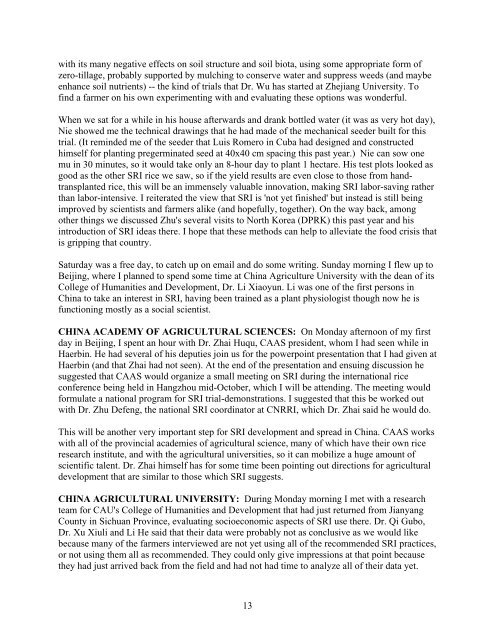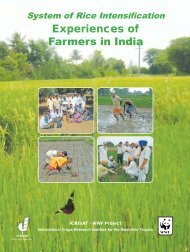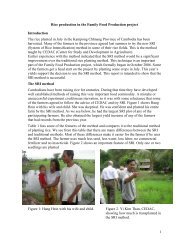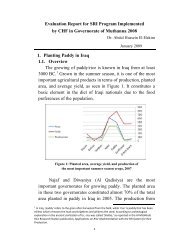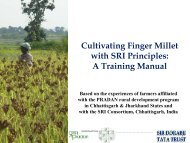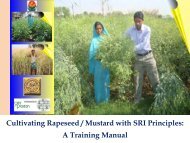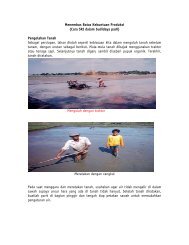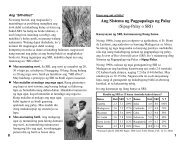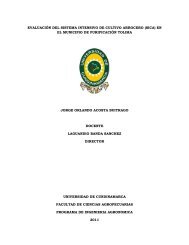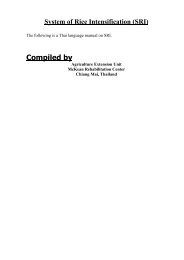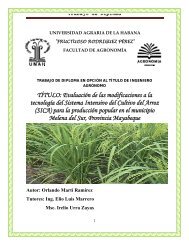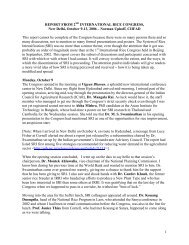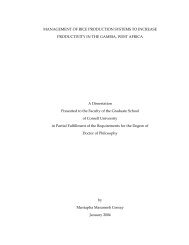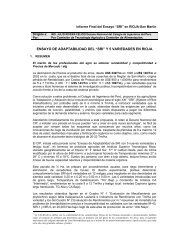Report from SRI China visit - The System of Rice Intensification ...
Report from SRI China visit - The System of Rice Intensification ...
Report from SRI China visit - The System of Rice Intensification ...
You also want an ePaper? Increase the reach of your titles
YUMPU automatically turns print PDFs into web optimized ePapers that Google loves.
with its many negative effects on soil structure and soil biota, using some appropriate form <strong>of</strong><br />
zero-tillage, probably supported by mulching to conserve water and suppress weeds (and maybe<br />
enhance soil nutrients) -- the kind <strong>of</strong> trials that Dr. Wu has started at Zhejiang University. To<br />
find a farmer on his own experimenting with and evaluating these options was wonderful.<br />
When we sat for a while in his house afterwards and drank bottled water (it was as very hot day),<br />
Nie showed me the technical drawings that he had made <strong>of</strong> the mechanical seeder built for this<br />
trial. (It reminded me <strong>of</strong> the seeder that Luis Romero in Cuba had designed and constructed<br />
himself for planting pregerminated seed at 40x40 cm spacing this past year.) Nie can sow one<br />
mu in 30 minutes, so it would take only an 8-hour day to plant 1 hectare. His test plots looked as<br />
good as the other <strong>SRI</strong> rice we saw, so if the yield results are even close to those <strong>from</strong> handtransplanted<br />
rice, this will be an immensely valuable innovation, making <strong>SRI</strong> labor-saving rather<br />
than labor-intensive. I reiterated the view that <strong>SRI</strong> is 'not yet finished' but instead is still being<br />
improved by scientists and farmers alike (and hopefully, together). On the way back, among<br />
other things we discussed Zhu's several <strong>visit</strong>s to North Korea (DPRK) this past year and his<br />
introduction <strong>of</strong> <strong>SRI</strong> ideas there. I hope that these methods can help to alleviate the food crisis that<br />
is gripping that country.<br />
Saturday was a free day, to catch up on email and do some writing. Sunday morning I flew up to<br />
Beijing, where I planned to spend some time at <strong>China</strong> Agriculture University with the dean <strong>of</strong> its<br />
College <strong>of</strong> Humanities and Development, Dr. Li Xiaoyun. Li was one <strong>of</strong> the first persons in<br />
<strong>China</strong> to take an interest in <strong>SRI</strong>, having been trained as a plant physiologist though now he is<br />
functioning mostly as a social scientist.<br />
CHINA ACADEMY OF AGRICULTURAL SCIENCES: On Monday afternoon <strong>of</strong> my first<br />
day in Beijing, I spent an hour with Dr. Zhai Huqu, CAAS president, whom I had seen while in<br />
Haerbin. He had several <strong>of</strong> his deputies join us for the powerpoint presentation that I had given at<br />
Haerbin (and that Zhai had not seen). At the end <strong>of</strong> the presentation and ensuing discussion he<br />
suggested that CAAS would organize a small meeting on <strong>SRI</strong> during the international rice<br />
conference being held in Hangzhou mid-October, which I will be attending. <strong>The</strong> meeting would<br />
formulate a national program for <strong>SRI</strong> trial-demonstrations. I suggested that this be worked out<br />
with Dr. Zhu Defeng, the national <strong>SRI</strong> coordinator at CNRRI, which Dr. Zhai said he would do.<br />
This will be another very important step for <strong>SRI</strong> development and spread in <strong>China</strong>. CAAS works<br />
with all <strong>of</strong> the provincial academies <strong>of</strong> agricultural science, many <strong>of</strong> which have their own rice<br />
research institute, and with the agricultural universities, so it can mobilize a huge amount <strong>of</strong><br />
scientific talent. Dr. Zhai himself has for some time been pointing out directions for agricultural<br />
development that are similar to those which <strong>SRI</strong> suggests.<br />
CHINA AGRICULTURAL UNIVERSITY: During Monday morning I met with a research<br />
team for CAU's College <strong>of</strong> Humanities and Development that had just returned <strong>from</strong> Jianyang<br />
County in Sichuan Province, evaluating socioeconomic aspects <strong>of</strong> <strong>SRI</strong> use there. Dr. Qi Gubo,<br />
Dr. Xu Xiuli and Li He said that their data were probably not as conclusive as we would like<br />
because many <strong>of</strong> the farmers interviewed are not yet using all <strong>of</strong> the recommended <strong>SRI</strong> practices,<br />
or not using them all as recommended. <strong>The</strong>y could only give impressions at that point because<br />
they had just arrived back <strong>from</strong> the field and had not had time to analyze all <strong>of</strong> their data yet.<br />
13


